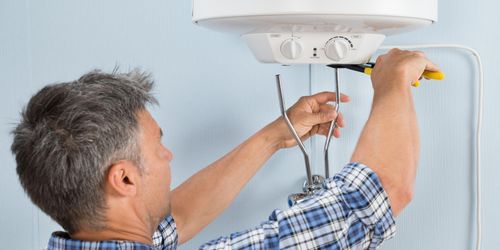Ways to Cope with the Major Hot Water Heater Urgencies
Ways to Cope with the Major Hot Water Heater Urgencies
Blog Article
Are you interested in critical information on Is Your Water Heater Leaking??

A hot water heater is among one of the most crucial fundamental home appliances that can be discovered in a house. With water heaters, you don't require to undergo the tension of heating water by hand every single time there is a demand to wash, do the laundry, or the dishes. There is constantly a possibility that your water heating system would act up as with most mechanical gadgets.
It is essential to keep in mind any type of little breakdown as well as tackle it promptly before points get out of hand. The majority of times, your water heater begins to malfunction when there is an accumulation of sediments as a result of continual use. As a safety measure, routine flushing of your water heater is suggested to stop sediment build-up as well as stop functional failing.
Usual water heater emergencies and just how to take care of them
Inadequate warm water
It might be that the water heater can not support the warm water demand for your apartment. You might upgrade your water heating unit to one with a larger capability.
Fluctuating water temperature level.
Your water heater can start producing water of various temperature levels typically ice cool or hot hot. There could be a requirement to replace either the heating or the thermostat device of your water heater.
Dripping water heater container.
In this circumstance, you ought to turn off your water heating system, enable it to cool down, and very carefully look for the source of the trouble. At times, all you need to do is to tighten up a few screws or pipeline connections in instances of minor leakages. If this doesn't work and also the leak lingers, you might need to utilize the services of a technician for an appropriate substitute.
Blemished or odiferous water
When this takes place, you need to understand if the concern is from the tank or the water resource. If there is no funny odor when you run chilly water, then you are certain that it is your water heater that is damaged. The odiferous water can be triggered by rust or the buildup of microorganisms or sediments in the water heater container.
Final thought
Some property owners ignore little caution and minor faults in their hot water heater system. This just causes further damages and a feasible complete breakdown of your appliance. You ought to take care of your water heater faults as soon as they come near stay clear of even more costs as well as unneeded emergency difficulties.
With water heating units, you don't need to go via the anxiety of heating water by hand every time there is a requirement to take a bathroom, do the laundry, or the recipes. It may be that the water heater can not sustain the hot water need for your house. Your water heating system might begin producing water of various temperature levels typically ice hot or cool hot. If there is no funny scent when you run cold water, then you are particular that it is your water heating system that is defective. The smelly water can be created by corrosion or the accumulation of germs or debris in the water heating system container.
Common Water Heater Issues and What You Should Do
What Type of Water Heater Do You Have?
Before we begin it’s first important that you identify the type of water heater you have on your property. There are two main types of water heaters out there: conventional and high efficiency.
Both of these types of products typically use either gas or electricity to heat power. There are also solar water heaters that use a thermal collector on the roof or yard to heat the water.
While these models are not as common, they can cut heating costs in half. In this article, we will focus on conventional and high efficiency.
How Do My Electric and Gas Water Heater Work?
Though they look similar, electric and gas water heaters work very differently. It’s important to know their basic function because often problems can be specific to the heating source.
In the electric model, a thermostat on the side of the machine detects the temperature of the water in the tank. When the temperature needs to rise electricity flows to a heating element suspended in the water.
Gas models also use a thermostat device — typically with a mercury sensor at the tip and an additional sensor called a thermocouple. The thermocouple detects whether the pilot light is on and controls the flow of gas.
When the thermostat drops below the appropriate level gas is released which becomes ignited by the pilot light. The flame heats the bottom of the water tank which causes hot water to rise and cold water to drop.
This natural circulation continues until the water reaches the desired temperature. Then, the thermostat triggers the gas control valve to shut off the flow of gas.
What Are the Most Common Issues and How Do You Fix Them?
https://happyhiller.com/blog/common-water-heater-issues-and-what-you-should-do/

As a reader on Is Your Water Heater Leaking?, I thought sharing that excerpt was smart. Those who liked our blog entry kindly don't forget to share it. Thanks a bunch for your time. Please check up our website back soon.
Address leaks promptly. Report this page